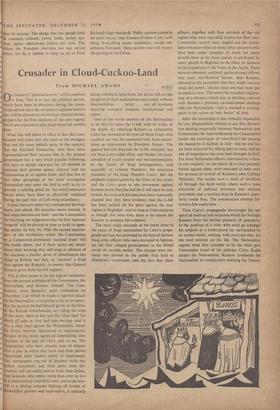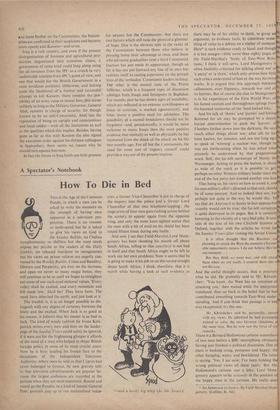Crusader in Cloud-Cuckoo-Land
From MICHAEL ADAMS uruiir ON January 6 'political activity' will be resumed in Iraq. That is to say, the political parties, Which have been in abeyance during the transi- tional period since the revolution eighteen months ago, will be allowed to reconstitute themselves and prepare for the first elections of the new regime, Which are expected to take place about six months later.
What this will mean in effect is that the Com- munists will come into the open as the strongest (but not the most united) party in the country; that the National Democrats, who have more representatives than anyone else in the present government but a very small popular following, Will have to decide once \ and for all whether to continue their present uneasy alliance with the Communists or to oppose them; and that one or two other groupings of the more courageous Nationalists may enter the field as well, to try to Provide a rallying point for the anti-Communist forces which have been so effectively scattered during the past year of Left-wing ascendancy.
Unless there are some very unexpected develop- ments just ahead, the outcome seems assured. If and when elections are held—and the Communists are throwing out suggestions that the first 'national congress' will be elected in time to hold its open- ing session on July 14, 1960. the second anniver- sary of the revolution—either the Communists Or a Communist-dominated 'national front' will Win hands down; and if there seems any doubt about their winning, they will stage in advance of the elections a further series of disturbances like those at Kirkuk last July, or 'uncover' a fresh plot against the Republic,-to ensure that General Kassem gives them his full support.
This at least seems to be the logical conclusion from the present attitudes of the Communists, the Nationalists, and Kassem himself. The Com- fnunists, since Kassem's press conference on December 2 (at which he made a vigorous attack on the Nationalists, even going so far as to contra- dict the account he had himself given, at the time, Of' the Kirkuk disturbances), are riding the crest Of the wave. Here at last was the 'clear lead' for Which all sides in Iraq had been waiting—and it Was a clear lead against the Nationalists, whom the Prime Minister denounced as reactionaries, dividers of the ranks, agents of imperialism, con- spirators in the pay of Cairo, and so on. The Nationalists, who were already near to despair after a year in which they have seen their parties suppressed, their leaders exiled or imprisoned, their newspapers run out of business (with one gallant exception), and their party aims dis- credited, will not easily recover from their defeat. And Kassem, who seems more than ever to live M a cloud-cuckoo-land of his own, and to see him- self as a shining crusader fighting off hordes of Unidentified plotters and imperialists, is certainly doing nothing to help them, for all his talk of 11.h.11'1 people in all their nationalities and creeds, without
discrimination . . [who] . . . are all brothers, enjoying complete freedom, brotherhood and rights.'
One of the worst enemies of the Nationalists in all this has been the UAR, with its Voice of the Arabs. By attacking Kassem so vehemently Cairo has damned in his eyes all those Iraqis who could in any way be connected with Arab.nation- alism as represented by President Nasser. The quarrel between Iraq and the VAR, certainly, has not been a one-sided affair, and Nasser can justly complain of much slander and misrepresentation at the hands of Iraqi propagandists, and especially of Colonel Mahdawi, the notorious president of the Iraqi People's Court.' But the emphatic support given by the Voice of the Arabs and the Cairo press to any movement against Kassem inside Iraq has laid the VAR open to such attacks. Kassem and his associates have repeatedly claimed that they have evidence that the VAR has been behind all the plots against the new regime in Baghdad—and so long as Cairo behaves as though this were true, there is no reason for Kassem to produce his evidence.
The most tragic example of the harm done to the cause of Iraqi nationalism by Cairo's propa- ganda services was provided by the fate of thirteen Iraqi army officers who were executed in Septem- ber for their alleged participation in the Mosul revolt six months earlier. The charges were cer- tainly not proved in the public trial held in Mahdawi's courtroom, and the fact that these
officers, together with four servants of the old regime who were especially known for their anti- Communist record, were singled out for imme- diate execution when so many other prisoners who have been under sentence of death for many months have so far been spared, is attributed by many people in Baghdad to the effect on Kassem of the broadcasts of the Voice of the Arabs. These were so vehement, and built up the accused officers into such anti-Kassem heroes, that Kassem, alarmed at the possibility that they might become rypjtior power, lost his head and had them put IQ doatlx at once. This seems tlie soundest explana- tion .of a decision which was in startling contrast with Kassem's previous cat-and-mouse dealings with the Nationalists—and it marked a turning- point in his career as 'sole leader' of Iraq.
After the executions it was virtually impossible for any dispassionate witness to say that Kassem was dealing impartially between Nationalists and Communists. He had condemned the Communists (under the soubriquet of 'anarchists') for causing the massacres in Kirkuk in July—but no one has yet been executed for taking part in them, and no one of importance has even been brought to trial. Yet these Nationalist officers, convicted by a three to two majority on the bench of a court patently biased against them, were executed at once over the protests of several of Kassem's own Cabinet Ministers. The results were a wave of revulsion all through the Arab world, where such a mass execution of political prisoners was without precedent, and a marked drop in Kassem's popu- larity inside Iraq. The assassination attempt fol- lowed a few weeks later.
Thus Cairo's propaganda encourages the sad spiral of mistrust and suspicion which has brought Kassem from his former pinnacle of popularity to the position of a ruler who must go amongst his subjects in a bullet-proof car surrounded by an armed escort, waiting, with everyone else, for the next attempt on his life. The Nationalists oppose what they consider to be the clear pro- Communist trend of his policies; Cairo Radio adopts the Nationalists; Kassem condemns the Nationalists as conspirators working for Nasser, and leans further on the Communists; the Nation- alists are confirmed in their suspicions and become more openly anti-Kassem—and soon.
Iraq is a rich country, and even if the present disorganisation of business and agricultural pro- duction degenerated into economic chaos, a government of some kind could limp along using the oil revenues from the IPC as a crutch (a very undesirable solution from 1PC's point of view, and one that would put the British Government in a most invidious position). Otherwise, and leaving aside the likelihood of a further and sucCessftil attempt to kill Kassem, there remains the pos- sibility of an army coup to unseat him; this seems unlikely so long as the Military Governor, General Abdi, remains in charge of security, for though known to be an anti-Communist, Abdi has the reputation of being an upright and conscientious and loyal soldier—with all the limitations as well as the qualities which this implies. Besides, having gone as far as this with Kassem (he also signed -the execution order against his thirteen colleagues in September), there seems no reason why he should turn against him now.
In fact the future in Iraq holds out little promise for anyone but the Communists—but there are two factors which still raise the ghost of a glimmer of hope. One is the obvious split in the ranks of the Communists between those who believe in pressing home their advantage at once, and those who advocate gradualism (and a third Communist fraction has just made its appearance, though so far it-has not put forward any line of its own but restricts itself to casting aspersions on the private lives of the 'orthodox' Communist leaders in Iraq). Tht other is the mental state of the Prime iiiister, which is a frequent topic of discussion amongst both Iraqis and foreigners in Baghdad. For months past he has shown signs of instability, which are reflected in an extreme unwillingness 4o listen to criticism, a marked egocentricity, and what seems a positive need for adulation. The possibility of a mental breakdown should not be forgotten—and, paradoxically, it would be more welcome to many Iraqis than the most positive evidence that mentally as well as physically he has recovered from the shock of the attack on his life two months ago. For all but the Communists, the need for some sort of 'regency council' could provide a way out of the present impasse.



























 Previous page
Previous page